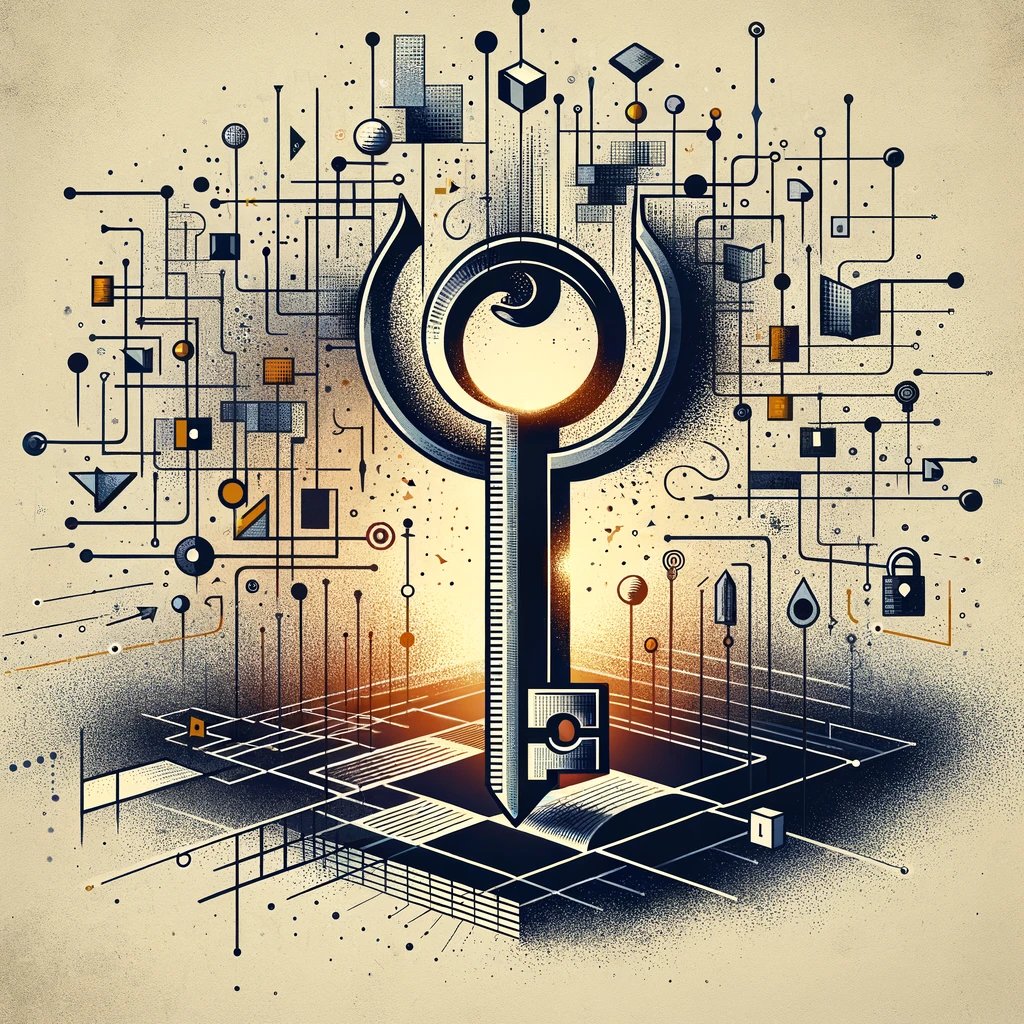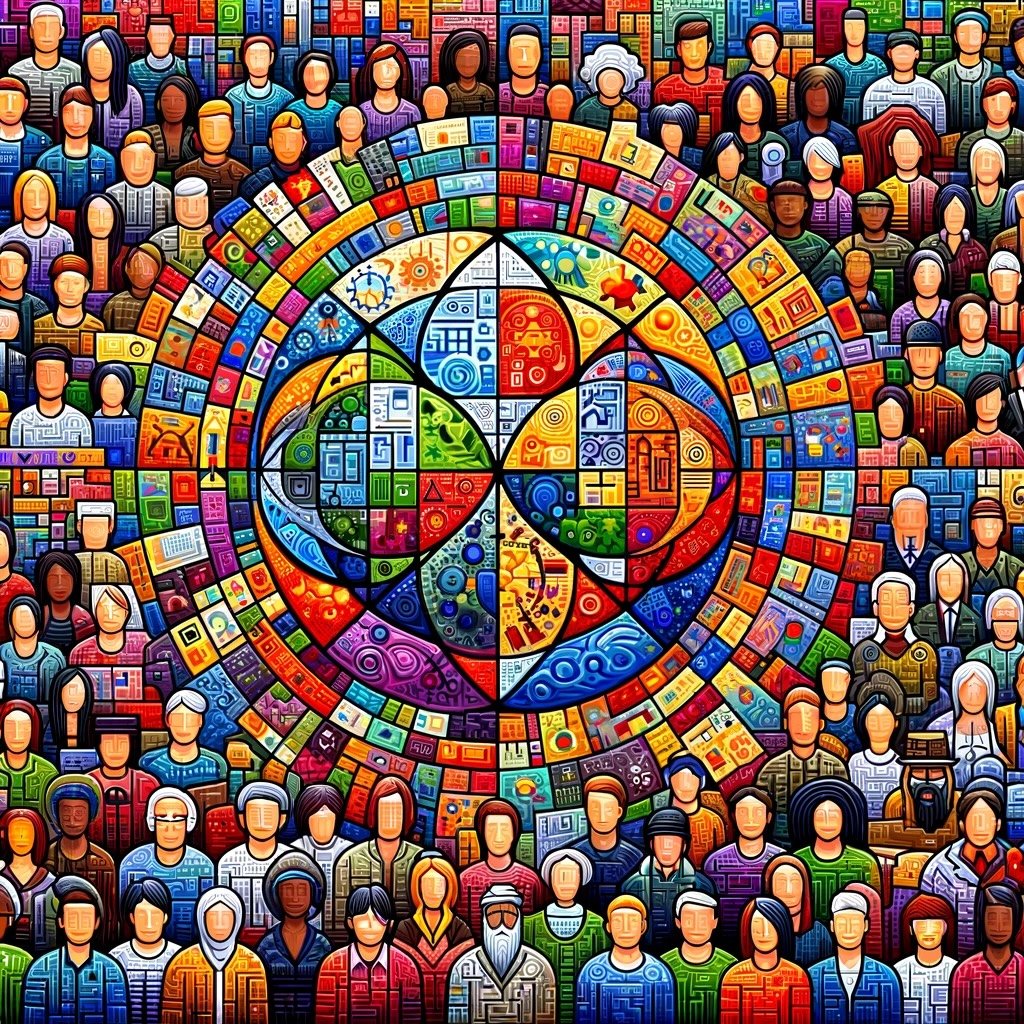Welcome to my blog!
Every morning, I begin with a cup of coffee and 15 minutes of free thinking. I write down everything that comes to mind, from new ideas to thoughts that emerged overnight. This is where I develop and refine my new research. You'll find some repetition and ideas still in progress. Some might seem unusual or unclear at first, but that's part of the journey! I'm excited to share how my ideas form and evolve.
The Logical Community
This post explores the necessity of logic in community development, highlighting how logical interaction fosters a neutral space for dialectical enquiry, enabling diverse perspectives to find common ground without imposing majority beliefs.
Why do we need logic in the community? This is a more important question to ask than why individuals need logic. I suspect many think of logic as a reasoning tool that guides in decision making, countering an emotional mind (perhaps a compassionate mind?) and that makes the “tough decision,” as the current prime minister of New Zealand keeps saying. What are tough decisions? I suppose something like cold-hearted, non-emotional, goal-oriented, and maybe also profit-maximising decisions? The kind of cold, rational, masculine strong mind that isn’t afraid of doing what’s right, where “what’s right” is assumed to be some universal goal of individuals. I hope you get the picture. I do think logic isn’t about that at all, even at the individual level, but still think that countering that kind of view isn’t the primary need for logic we have in the modern world.
No, instead, and this is why I asked my original question as being about the community, I want to ask a tougher question about why a lack of logical interaction (not just a lack of logic) is a barrier to community development. What would be better logic? In Logic in the Wild, I develop logic as the communal tool that provides a “neutral space of dialectical enquiry.” It is a bit of a mouthful, but it’s easy to break down. An enquiry is a shared intellectual goal—to reach a decision, come up with a plan, figure out the truth, or express and hear each other’s stories. A dialectical enquiry is one that seeks different perspectives. If you have a group of people, each will have their own view guiding their interest and ways of thinking about the enquiry, and a dialectic practice is to entertain each on their own terms.
Neutrality, then, is what is hardest to establish in a dialectical space of enquiry. It occurs when people do not clash on their strong opinions or their fundamental beliefs, but instead seek to appreciate the coherence in each other’s views. If we can’t appreciate that others can reason coherently, even though we don’t share fundamental beliefs, we won’t be able to reach the more important step in the enquiry, finding a common ground for resolution that accommodates everyone. Neutrality here means that no one can impose a way of thinking or believing in a disproportionate manner, even if it is the way of the majority.
What I notice a lot in recent discourse, now that oppressed minorities are finding platforms to contribute to social enquiries, is a rejection from the majority for not wanting everyone to abide by the will of the minorities, as if dropping the imposition of their beliefs in dialectical spaces amounted to disproportionately valuing those of minorities. See how I phrased it? I didn’t say that the majority had to adopt the views of the minorities, but rather that they should engage neutrally and not impose their ways of thinking and being on everyone. Everyone needs to establish neutrality, in my opinion, to achieve better dialectical results. Seeking common resolutions that are equitable in a community requires the majority to recognise and accept that their ways of thinking, their fundamental beliefs and strong opinions, can be individually preserved without being socially imposed. That is the logical way.
Well-Intentioned Interruption?
This post asks why we keep interrupting each other. Is it out of good intentions? Learn how a simple trick of posing uptake questions can help us do better.
Why do we do it? Is it for the sake of others, for the group, or out of selfish interest? I don’t think people are generally ill-intended when they fail to listen and keep interrupting each other. Sometimes with friends or family, we express genuine feelings about stressful situations related to health, relationships, or work. Our close ones want to help. They want to propose solutions they think will address our problems. They've understood enough about what we've said and know us closely, so they don't need the gory details of what happened or how we feel. They already empathise with us and want what’s best for us. It’s not so much that they don’t want to listen, but that they genuinely want us to feel better by seeking solutions. It's further a social role for family to offer parenting advice and friends to provide psychological support. People get used to performing their social roles and are comfortable in them. So they interrupt us before we can complete our thoughts, helping us see that our bad feelings are not necessary or justified, and offering solutions to get out of our problems. Does that help? Not in my experience. I can be my own parent, and if I need a psychologist, I’ll pay to see a professional. Unless I ask for brainstorming ideas or solutions, what I seek is to share my experiences with someone who will listen, understand, and take some of the stress away by simply being present and listening.
But why do we do it when it’s not about problems? Why do we interrupt each other and offer our opinions or beliefs without listening to what others think? Are we similarly trying to help? Instead of correcting their feelings, are we attempting to correct their beliefs? I don’t think people are ill-intended when they fail to listen to a thought being expressed, interrupt the speaker, and say what they think on the subject. I don’t think we realise when we keep stopping someone from sharing their thoughts. Or perhaps it’s some kind of learned behaviour to express something good and be rewarded for it. That would be more out of selfish interest, to present ourselves as good or smart people. Or perhaps it’s even a defensive reflex, out of fear of not showing that we understand the topic or have something interesting to contribute. It’s not always comfortable to be in a discussion when the rules of engagement are not clear. When do we transgress at a dinner party? At a family dinner? At the pub? When do we go too far? Some people will turn everything into a joke, either finding a funny angle on what is said or by expressing something relevant to the topic but in full irony. Is that a defensive measure? Because if we’re wrong, it doesn’t matter since we weren’t trying to be right, but to be funny.
A simple trick I’ve learned from working with my colleague Maree Davis in education is to teach students the use of uptake questions. Instead of saying, “I don’t agree with this,” or interrupting a speaker with what we think is a better opinion, ask a question that invites others to develop their ideas: “Why do you say that?” “Why do you believe that?” Leave it open; don’t ask a rhetorical question that tells them they’re wrong, such as, “Don’t you think it’s more like [express your opinion]?” I wonder what your experience will be. One thing I’ve noticed is that when people are given time to develop their ideas, they feel more comfortable expressing themselves in more nuanced, constructive ways that everyone benefits from listening to. That is one way to enforce neutrality in a dialectical space of enquiry.
The Need for a Neutral Space of Dialectical Enquiry in the Community
This post explores the importance of engaging with a logical mindset in discussions, using a personal experience to illustrate how logical enquiry can foster constructive communication.
This weekend someone asked me what were my thoughts on AI. I started trying to express why I thought the situation is rather scary, trying to lay out some elements to articulate some of my thoughts. But the person had an opinion on it, which I assume he thought was inconsistent with mine, and started interrupting me to tell me about it. I found myself in a defensive mood, not being able to express what I was trying to say, trying out different random things to see if it might catch, but he never listened to what I was saying for more than a couple of sentences. Eventually he stopped engaging with the subject and made it clear that he didn’t want to discuss it any further. I felt frustrated, unable to articulate a coherent thought, and dismissed from further exploration of the topic.
It’s not a topic I initiated; he asked me what I thought about it. But I didn’t sense that he wanted to hear what were my views. Elements of what he said when cutting me off were elements I could have worked with to try and reach a constructive resolution of the seeming clash between our ideas. I say a seeming clash because I’m not sure we hold such opposite views at all. What I’ve experienced, and I wrote Logic in the Wild partly to try and help people to better apply logic in the community, is a failure of engaging in what I call a “neutral space of dialectical enquiry”.
This is one of the main points of Logic in the Wild—the other being that logic is the Guardian of Coherence—namely that logic can help interaction in the community if people can enter a space with a logical mindset. To enter the space with a logical mindset is to suspend opinions and beliefs and focus on the coherence of other people’s views. Instead of cutting me off and asserting that AI isn’t scary because it’s just like previous technological advances, my friend could have asked why I found AI frightening. This approach would allow us to explore whether my concerns were coherent with other views he held, which we likely shared to a significant extent.
By immediately focusing on content and opinions, instead of coherence and logic, the dialectical space was closed off. It stopped being dialectical when we were not able to consider the topic from various perspectives and try to figure out what each other thought. Mind you, I probably failed to engage as well in my defensive reactions when I felt my ideas dismissed. Logic failed in this instance because we both failed to engage in a space with a common logical goal.
That’s one thing you’ll learn in Logic in the Wild, that logic isn’t an individualistic discipline, but rather a communal one that requires cooperation and constructive engagement with one another. Indeed, it can foster that constructive communication by offering neutrality and a way to explore various ideas without locking horns on basic beliefs and opinions.
I wonder if you’ve experienced similar situations in your community, and also if you can think of moments when you’ve failed to engage in a neutral space of dialectical enquiry. Do you reckon you could have done better had you approached the discussion with a logical mindset?
Why Logic? Beyond Individual Insight to Societal Unity
This post explores how learning logic not only sharpens individual reasoning and debate skills but more importantly serves as a foundational tool for fostering societal cohesion and constructive dialogue.
What is one big benefit that people could get from people learning logic?
A straightforward response might highlight personal benefits such as enhanced clarity in reasoning, coherence in beliefs, and improved communication efficacy. Envision communication as a strategic game where participants aim to persuade each other of their viewpoints; logic equips you with the strategies to avoid errors in thought organization and expression. While logic itself doesn’t directly bestow truth, it ensures the preservation of truth—assuming you commence with true beliefs, logical progression maintains that integrity. Logic empowers you to dissect and simplify complex views into their foundational truths. You can thus reason from your goals, starting with the view that you want to defend, and break it down into simpler components from which it follows and that are easier to support logically. With logic, you can build chains of reasoning that go from truths you know to truths you learn. In essence, logic is indispensable for truth-seekers: identifying a logical mistake negates the necessity to contest the proposition’s truth, as flawed reasoning destroys the argument itself, irrespective of content. These virtues of logic are particularly pronounced in debate contexts, where success is gauged by persuading the audience of your standpoint over that of your adversary, and extend to the political arena in policy communication and electoral strategies. This perspective underscores logic's individualistic benefits.
In Logic in the Wild, however, I articulate a richer response to the question, not targeted at benefits to individuals, but at benefits to society. The slogan I use is that logic provides a “neutral space of dialectical enquiry”-a space in which participants collaborate to explore the coherence in the various views on the same topic, and seek a common ground, seeking a stance that is neutral and aligns with all parties in the exchange of ideas. This approach transcends the contentious battle over the truth of beliefs, championing instead a constructive scrutiny of mutual interests and shared resolutions. Engaging neutrally in this dialectical space requires participants to eschew dogmatic defense of personal views in favor of a collaborative quest for logical common ground and collective understanding. This, in my view, represents logic’s most profound contribution: not in amplifying individual agendas but in bridging divides towards unified solutions. In a world infested by social media that polarises populations into extreme and untenable views, reinforced by “like buttons” that transform debates into voting procedures over opinions, logic is the beacon of hope that can redress constructive dialogue in society.
Is There Such a Thing as Neutrality in Logic?
This blog post challenges the traditional view of a singular, universal logic, exploring the nuances of neutrality in logical enquiry and the dynamic, context-dependent nature of logical application.
If logic provides a "neutral space of dialectical enquiry", but neutrality can vary with each space of enquiry, is there really such a thing as neutrality? Is neutrality something that allows degrees, that permits variation? An orthodox view, one dominant in the twentieth century, is that there’s only one logic; one logic to rule them all. That logic is universal and neutral. It is universal because it applies to everything, and it is neutral because it isn’t affected by content. When I talk about a neutral space of dialectical enquiry in Logic in the Wild, I’m inspired by this orthodox view. I’m inspired by it, but I’m not bound by it and ultimately, I come to reject it.
I reject it because I believe logic is much more than what twentieth-century mathematicians have reduced it to. I reject it because the standards of reasoning they've adopted are not suitable for all spaces of enquiry. I also reject the orthodox logic of the twentieth century because it fails to recognize coherence amidst the weird, the absurd, the inconsistent, or the paradoxical. The logic of the twentieth century is too intolerant to serve practical purposes across a wider range of applications.
Although I don’t discuss this in Logic in the Wild, I've defended logical nihilism in previous blog posts. Logical nihilism is the view that there are no universal laws of logic. This perspective directly challenges the idea that logic offers a neutral space for dialectical enquiry. What kind of neutrality are we referring to if there isn’t a universal logic to regulate neutrality, if there are no laws of logic at all? This raises doubts about the very possibility of a neutral space of dialectical enquiry. What does neutrality mean if there's no universal logic to govern it, if logic itself has no laws? This could imply the non-existence of a truly neutral logical space. So, what role does logic play? Is it merely to assess argument coherence, or does it still delineate practical boundaries for deliberation?
I maintain that neutrality is crucial for logic's application, yet it's a complex, multifaceted concept rather than a straightforward one. Neutrality must be negotiated within each space of enquiry, potentially evolving as discussions progress. The use of "neutral space" in my discussion might suggest a singularity in logical spaces of enquiry, a misunderstanding I hope to clarify here. Just as stating "flying provides a means of transportation" doesn't imply only one way to fly, or saying "a cat purrs when content" doesn't mean there's only one cat, so too does my reference to logic's provision of a neutral space not denote a singular mode of enquiry. Logic, in its practical role during deliberation (alongside guarding coherence), aims for neutrality that adapts to the context of each enquiry.
Finding Neutrality in Logic's Dialectical Enquiry
What does it mean for logic to provide a neutral space of enquiry, and can it truly achieve this? This blog post explores the concept of dialectical enquiry in logic, examining the pursuit of neutrality among diverse viewpoints and the challenges in sustaining it.
In Logic in the Wild, I discuss the notion of logic providing a “neutral space of dialectical enquiry”. By neutrality, I mean a focus on coherence rather than cogency—on logic instead of truth. This approach refrains from prioritizing any content over another. For example, when deliberating on human origins, excluding creationist arguments for solely scientific ones disrupts neutrality, as does mandating a divine explanation alongside scientific discussions. Logic itself does not resolve the existence of God or the exclusion of divinity by scientific methods. This goes beyond the purview of logic, going into content-specific debates.
In Logic in the Wild, I emphasise logic as creating a "neutral space of dialectical enquiry," where the focus is on coherence rather than cogency, meaning the logical structure takes precedence over the pursuit of truth. This seeks to ensure no particular content is favored over another. For instance, if a discussion on human origins excludes creationist viewpoints solely for scientific evidence, or conversely, necessitates divine explanation alongside scientific theories, then the space ceases to be neutral. Logic, in my exploration, does not settle debates about the existence of God or the exclusion of such notions by science, as these discussions extend beyond logic's scope into content-specific arguments. One might wonder, "Why not consider truth?" To this, I offer several practical responses in the book, illustrating the benefits of shifting deliberation within communities from the content of beliefs to their logical integrity.
However, is it possible for an inquiry to remain truly neutral? And can such neutrality extend to the standards of coherence recognized in deliberation? The spectrum of reasoning standards—from mathematical validity and legal "beyond reasonable doubt" to probabilistic reasoning—complicates this neutrality. If only valid reasoning is permissible, debates on topics like creationism versus evolution struggle to commence, as neither side can conclusively "prove" their stance. Conversely, overly lenient standards hinder progress by allowing both sides to construct seemingly coherent arguments.
Identifying the optimal balance for deliberation demands a careful navigation between dogmatic insistence and gullible acceptance. It involves finding a middle ground that promotes meaningful discourse without sacrificing the integrity of logical exploration, all the while maintaining neutrality.
Unraveling Feminist Logic: A Critical Lens on Power and Neutrality in Dialectical Spaces
In this post, the Logic in the Wild framework is employed to refresh feminist critiques of logic, steering away from evolutionary simplifications and gender symbolism errors.
Is there such a thing as feminist logic, and what is it? It's crucial to understand that feminist logic is not a form of reasoning exclusive to females, women, or what might be considered 'feminine' thinking. If we entertain the idea that logic is a product of evolution, it's hard to imagine how it could have developed differently for female members of our species compared to males over thousands or millions of years. Despite potential internet lore suggesting otherwise, the notion seems implausible at best.
The distinction between feminine and masculine logic, especially when considering these concepts as social constructs, falls into the trap of gender symbolism. This is the erroneous practice of assigning gendered traits to non-gendered entities, such as the Moon being feminine and the Sun masculine in French, a convention that varies across languages. Given that logic serves as the guardian of coherence, focusing on patterns of thought rather than content, as I present it in Logic in the Wild, attributing gender symbolism to it constitutes a categorical mistake.
This leads us to inquire: does feminist logic relate to the distinction between man and woman, a debate more centered on gender than sex? At this juncture, the intersection of feminism and logic becomes increasingly relevant. Research specifically targeting the question of whether women employ a distinct form of logic is sparse. Historically, the discourse has predominantly leaned towards broader intellectual disparities. A narrative deeply rooted in European history, stretching back to Ancient Greece, posits that women are predominantly influenced by emotions and passions, as opposed to reason. This perspective finds echoes in discussions concerning race, skin color, and sexual orientation, among other attributes. I’ve discussed these parallels in a previous post, highlighting how intersectional concerns render such accusations absurd.
However, conceptualizing logic as the guardian of coherence clarifies that it operates independently of gender identification. This demonstrates that the function of guarding coherence goes beyond the nuances associated with gender identity. Thus, feminist logic is not merely about identifying a distinct form of reasoning tied to females, women, or femininity. In Logic in the Wild, I discuss how logic provides a neutral space for dialectical inquiry. It is at this point that feminist critiques become particularly important and relevant. These critiques urge a critical examination of the notion of neutrality. The idea of a dialectical space, filled by agents with varying levels of power and influence, highlights that neutrality in terms of content does not inherently lead to justice or an equitable distribution of power within such spaces. This insight emphasizes the need for a nuanced understanding of logic's role in societal discourses, bringing to the fore the vital intersections where feminist concerns are paramount.
It is in this context that feminist logic offers a profound critique of the power imbalances persisting in supposedly neutral dialectical spaces of enquiry. This analysis extends beyond feminism to include insights from queer theory, post-colonial theory, and critical theory at large.
In conclusion, feminist logic represents a critical examination of the power dynamics inherent in neutral spaces of dialectical inquiry, highlighting the need for equity and justice. It challenges us to rethink our assumptions about neutrality and the distribution of power in intellectual discourse, informed by the valuable perspectives of feminism and other critical theories.
Logical Nihilism: Rehabilitating the Concept of Neutrality in Logic
This post explores how logical nihilism reinterprets traditional logic, presenting a novel approach to neutrality in logical discourse and its impact on dialectical spaces.
And we're back to discussing logical nihilism. Let's explore whether logical nihilism can alleviate the tension at the foundations of logical thinking and the shortcomings of neutrality in ensuring equality within a dialectical space of enquiry. In the context of the philosophy of logic, 'nihilism' is a technical term. It's distinct from the general definition of 'nihilism,' which, according to my dictionary, means "the rejection of all religious and moral principles, in the belief that life is meaningless." Logical nihilism doesn't concern religious or moral beliefs.
My thesaurus first lists synonyms for nihilism as "negativity, cynicism, pessimism; rejection, repudiation, renunciation, denial, abnegation; disbelief, non-belief, unbelief, scepticism, lack of conviction, absence of moral values, agnosticism, atheism, non-theism." The second batch of synonyms includes "anarchy, disorder, chaos, absence of government, lawlessness, mobocracy." Both sets of terms paint nihilism in a rather negative light, something humorously portrayed in The Big Lebowski. None of these seems directly relevant to addressing issues of equity in dialectical spaces. However, it's this second set that brings us closer to understanding logical nihilism, not through the concept of anarchism, which tends to inflate egotism, but rather through the idea of lawlessness. Logical nihilism posits that there are no inherent laws of logic. Each time I mention this, I instinctively wonder: “But what remains of logic if there are no laws?” considering logic is fundamentally about “the laws of thought.” This concept is deeply ingrained, asserting that logic is universally applicable, its laws holding true regardless of context, implying its neutrality.
Embracing logical nihilism means challenging the very idea that logic is neutral. But in my work, "Logic in the Wild," don't I argue that logic facilitates a neutral space for dialectical enquiry? Indeed, because logic excels at this! However, I don't assert that this space remains identical across all dialectical endeavors. Logic, acting as the guardian of coherence, applies different standards in varied contexts. In mathematics, 'consistency' measures coherence, while 'beyond reasonable doubt' sets the standard in legal proceedings. Meanwhile, probability and statistics play a crucial role in guiding policy-making, particularly in fields such as public health and economics. Thus, each context demands a unique measure of coherence, leading to distinct interpretations of neutrality.
Contrary to the belief that there's a singular, all-encompassing logic, logical nihilism advocates for a more flexible approach to logical practice, allowing for nuanced expectations regarding neutrality. By accepting the negotiability of neutrality at the core of our thinking, we reopen the possibility of addressing issues of equity. Far from being a radical rejection of logic as meaningless, logical nihilism invites us into richer, more constructive dialectical spaces of enquiry. It encourages participants to engage more deeply and constructively. That, at least, is my hope.
Logic, Impartiality, and the Human Mind: Navigating Biases and Reflexes
This post explores the concept of impartiality in logic and human thought, examining our inherent biases and how we can strive for a balanced approach to decision-making.
Can we ever truly achieve impartiality? Is it possible for logic to be completely neutral? These questions provoke profound reflection on the nature of our thinking processes. To become impartial, one must grow up free from biases, prejudices, and partisanship. This means not only refraining from or correcting sources of impartiality but being fundamentally impartial at the core. Given our human nature, this seems an improbable goal.
Biases and prejudices are embedded in our psychology, influencing our daily thoughts, interactions, and even how we form relationships and communities. In "Logic in the Wild," I discuss the concept of mental reflexes, drawing an analogy to physical reflexes like the flinch response. Boxers, for example, can learn to reduce but never fully eliminate this reflex. Similarly, our mental reflexes are deeply ingrained.
Psychologists Daniel Kahneman and Amos Tversky developed a theory around our psychological systems, labeling them as System 1 and System 2. System 1 is responsible for fast, unfiltered thinking, aiding in quick decision-making. System 2, on the other hand, is slower, geared towards problem-solving and deeper thought. Understanding and balancing these two systems is crucial, whether in situations requiring rapid decisions (like playing tennis) or those demanding careful consideration (such as deciding to propose to a partner).
The key isn't to suppress System 1 entirely; in fact, sometimes it's quite the opposite. For instance, quick thinking is essential when dodging an obstacle while cycling. We should embrace mental reflexes but not be enslaved by them. However, as I discuss in the book, even System 2 is fallible. Thinking slowly doesn't necessarily equate to thinking truthfully or coherently. Hence, I advocate for logic as a 'slower' system of thinking, System 3, one that not only circumvents mental reflexes but also addresses illogical patterns inherent in System 2.
Judges, perhaps, exemplify individuals who effectively utilize what could be termed Systems 2 and 3. They strive not to eliminate their biases and System 1 thinking but to ensure their decisions are justified independently of these influences. They are capable of ruling against their mental reflexes and instincts in such a manner that a third party could understand their decision-making process without any insight into the judge's personal biases. The goal, therefore, is not to eradicate biases but to act in ways that are informed by them only when necessary or appropriate.
Regarding neutrality, I propose a similar approach. Instead of striving for a logical mode of inquiry completely detached from content, logical praxis requires us to guard coherence in a way that is neutral with respect to content. It's essential to recognize, however, that logic itself is not entirely neutral. Logic is built upon fundamental assumptions, manifesting as rules of thought or laws about truth, that are intrinsic to its evaluative standards. These assumptions, akin to biases and mental reflexes, are elements we can't completely eliminate but can learn to navigate. Just as we acknowledge and work with our biases and reflexes, we must do the same with these logical underpinnings. This recognition doesn't undermine logic; rather, it enhances our understanding and application of it. Therefore, neutrality in logic isn't an absolutely inherent quality. Logic provides the means to guard coherence, aiming to achieve the appropriate level of neutrality in our space of inquiry.
What do you reckon?
Neutrality Against Equality: A Dialectical Dilemma
How does the neutrality of logic fail to produce equality in dialectical enquiry?
In yesterday's post, I raised a question: does the neutrality or even impartiality of a dialectical space of enquiry necessarily lead to equality? This is a question worth delving deeper into. Let's consider this: How can a neutral and impartial dialectical practice possibly not treat its participants equally? Or, more specifically, how can such a practice fail to offer equal access to enquiry despite its neutrality and impartiality?
Initially, I treated neutrality and impartiality together to contrast them with the concept of equality, noting their distinct roles in dialectical spaces. It's crucial to distinguish between these terms to avoid potential misinterpretation. Impartiality primarily concerns the behavior and psychology of the interlocutors — their capacity to identify and mitigate their own biases and prejudices in judgment. It speaks more to the dynamics between individuals rather than to the inherent qualities of the enquiry space itself. Neutrality, in contrast, can be inherent to the space of enquiry itself, serving as a characteristic that emphasizes logical structure over content. This distinction underscores that while impartiality is about people and their interactions, neutrality is about the very nature of the enquiry space. Recognizing the importance of this distinction, my focus will be primarily on exploring the concept of neutrality and its implications.
The critical question then becomes: How can a neutral dialectical practice fail to provide equal access to enquiry? The type of neutrality in question here is that offered by logic, which involves abstracting from the content of beliefs or theories and concentrating on structure. As I argue in "Logic in the Wild," maintaining coherence neutrally means seeking good logical patterns in reasoning, regardless of content. Examples abound where arguments are logical, irrespective of whether their components are true or false. In theory, as long as the enquiry is predominantly logical, any content is permissible. This includes everything from ancient optics, which visualized beams emanating from the eyes to perceive the world, to alien abduction narratives, all of which can be as logically coherent as the most established modern scientific theories. How then does this not foster equality?
There are two key ways this occurs:
1. Insights from critical theory (encompassing feminism, queer theory, race theory, and post-colonial theory) suggest that societal biases are so pervasive and systematic that they lead practitioners to believe they are reasoning without assumptions, when in fact they are enforcing deep-rooted doxastic commitments in their dialectical enquiry.
2. Logic itself harbors inherent assumptions in the rules and laws it upholds, potentially creating a form of epistemic injustice by disallowing views that challenge these assumptions. A notable example from recent decades is the emergence of paraconsistent logics, which accommodate inconsistent theories. Orthodox twentieth-century logic equates inconsistency with triviality — an ultimate absurdity. However, scholars exploring indigenous philosophies have recognized that these worldviews often necessitate a tolerance for some inconsistency due to the conceptual spaces in which they operate. If a dialectical space of enquiry does not accommodate inconsistency due to its logical standards, despite claiming neutrality, it risks excluding alternative conceptual frameworks under the guise of triviality. This exclusion inevitably leads to inequality.
This issue presents a profound challenge. The rise of paraconsistent logics, which permit inconsistency, starkly contrasts with the orthodox view of twentieth-century logic where inconsistency was synonymous with triviality. This shift is significant, especially for scholars interpreting indigenous philosophies. These philosophies often require an acceptance of certain inconsistencies, which traditional logical frameworks might dismiss as trivial. If our dialectical spaces, governed by these orthodox logical standards, reject inconsistency, they inadvertently marginalize these alternative conceptual frameworks, perpetuating inequality.
Such a scenario illustrates a deep and ongoing problem in the field of logical enquiry: the potential for epistemic injustice rooted in the very foundations of logic. This is a dilemma that will continue to engage and challenge my thoughts for some time to come.
Neutrality and Impartiality in Logic: A Quest for Equality in Dialectical Spaces
Do the principles of neutrality and impartiality in logical discourse foster equality in the realm of dialectical inquiry?
Today, I aim to discuss the concepts of neutrality, impartiality, and equality. Neutrality and impartiality share a closer relationship than they do with equality. In the realm of logic, my inquiry centers on whether these two principles engender equality, particularly within a dialectical space of enquiry. Curious about what constitutes a dialectical space of enquiry? Discover more in my book, "Logic in the Wild."
My focus here is a conceptual analysis centered on logic. Neutrality pertains to refraining from taking sides and maintaining a distance from the content of arguments. Within a dialectical context, where various perspectives undergo scrutiny, logic seeks neutrality. This neutrality is not about the truth of claims but rather the coherence of different beliefs or theories. It concentrates on the structure of thought, disregarding the content or truth of the arguments. Consider, for instance, a debate on intelligent design versus the multi-verse theory. Logic remains neutral between the existence of God or the multi-verse. It seeks to discern which theory better accounts for the facts, not which is true. The question of existence is undoubtedly significant and intriguing; however, it falls outside the purview of logic, particularly since proving the existence of God or a multi-verse is exceptionally challenging.
Impartiality, on the other hand, is more pragmatic. It involves fairness and unbiased judgment or decision-making. Logic aids in this regard not by prescribing actions or judgments, but by fostering coherence in thought processes. Impartiality endeavors to avoid presumptions about content, not only concerning the truth of the content but also any value judgments, such as those on a good-bad spectrum. If the content of a decision or judgment involves individuals, impartiality aims for equitable treatment. Thus, neutrality is more theoretical, while impartiality is more practical.
Now, let's consider equality. Here, we shift our focus from the application of logic in a neutral or impartial manner to the subjects of inquiry and whether they are treated equally. The concept of equality is indeed nebulous. What does it mean to treat God and the multi-verse equally? Is one being a scientific hypothesis a factor of superiority? How do we equate theological and scientific hypotheses? These questions are challenging to answer, particularly given the partial attitudes of both theists and atheists.
I'm not here to resolve this debate. Rather, my question is whether neutrality and impartiality in logical interactions within a community, particularly in the dialectical space of enquiry, lead to equality. Does the theoretical neutrality of logic, coupled with its purportedly impartial application, ensure equality in outcomes? This is a question that I will continue to ponder in the times ahead.






























































































Examining the ways populism exploits incoherence and bad logic to make truth irrelevant, and the dangers this poses to political discourse.